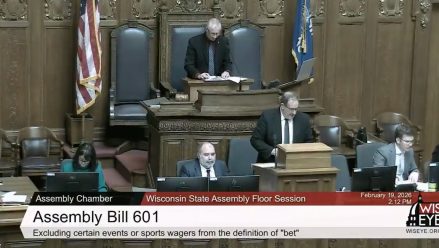Potawatomi Hotel & Casino CEO and General Manager Dominic Ortiz said Wednesday that Wisconsin Indian Country is “moving the vote to January” on a bill that would put the tribes in charge of digital sports betting. The bill was pulled from an Assembly vote Wednesday morning.
SB 592 would alter the definition of the word “bet” in the state to allow sports betting, and would allow the tribes to offer statewide digital wagering via a hub-and-spoke model. The Sports Betting Alliance (SBA), comprised of bet365, BetMGM, DraftKings, Fanatics Sportsbook, and FanDuel, spoke in heavy opposition to the proposal in early November.
Wisconsin tribal leaders were outraged by the SBA’s stance, and Wednesday on the New Normal webinar, “The Battle for Wisconsin,” Ortiz briefly addressed the move to delay the vote, saying that Indian Country was behind it.
He also told host Victor Rocha that the commercial industry is “paddling against Niagara Falls in a canoe,” and that the tribes will continue to push for legal sports betting under an Indian Gaming Regulatory Act (IGRA) model vs. a commercial model. Under an IGRA model, tribes have exclusivity and their technology partners are required to pay 60% of revenue to tribes. So far, the only state with an IGRA hub-and-spoke model in the U.S. is Florida, where the Seminole Tribe’s Hard Rock Bet platform is the only one available in the state.
On Nov. 4, SBA lobbyist Damon Stewart testified against the bill, saying, “This bill won’t get the job done because national brands cannot operate.” The operators could partner with tribes, but Stewart went on to explain the cost of a 60-40 revenue share would be prohibitive. Stewart also told the Senate Committee on Agriculture and Commerce that an IGRA-model landscape would not maximize revenue to the state or offer enough choices for consumers.
State of betting now in Wisconsin
Wednesday, Ortiz and Nicole Boyd, chair of the Red Cliff Band of Lake Superior Chippewa Indians, pressed the point that Wisconsin’s tribes have and want to preserve exclusivity for Class III gaming. Currently, a handful of Wisconsin tribes, including the Oneida Nation and Ortiz’s Potawatomi, offer in-person sports betting. There are 11 gaming tribes in the state, and in 2021, the Oneidas became the first to have legal betting added to their compact.
Wisconsin tribes have what’s referred to as a “Me Too” clause in their compacts. That means that as each tribe reaches their opportunity to renegotiate, it can get whatever other tribes and the state agreed on. In addition, the clause also allows a tribe to amend its compact based on what the tribes that follow get.
SB 592 would allow for sports betting that extends beyond the reservation. If the law passes, tribes would then likely have to recompact and include the phrase “bets are considered placed where received,” and every bet made in Wisconsin would then have to flow through a server on tribal land.
Tribes have bonded over experience
“From our perspective they want to have ownership, ownership of Wisconsin, and that’s not what a partnership is,” Ortiz said. “If you want to come in and respect the tribes, and have a pliable model, it’s about working with the tribes and under IGRA.”
Ortiz previously said that he had not been contacted about opposition from the commercial industry, and was surprised by the Nov. 4 testimony. Since then, Boyd said the conflict between the commercial industry and the tribes has had an unintended effect that is positive for Indian Country.
“This has strengthened relationships,” she said. “They [commercial industry] aren’t the cooks in the kitchen, and they don’t like that. There is lot of trust in the relationships from all 11 tribes in the state.”






